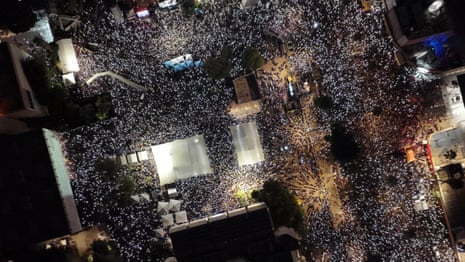Israel has said it will deliver its response to international mediators by Friday over a new Gaza ceasefire plan accepted by Hamas amid mounting pressure for a truce in a war that has claimed more than 62,000 Palestinian lives.
After mass protests in Israel demanding a deal to secure the release of the remaining 20 living Israeli hostages held in Gaza, it appeared that Hamas had reduced its demands over a prisoners-for-hostages exchange as well as over the scope of an Israeli-demanded “security buffer zone”.
Under reported details of the proposed plan, about half of the remaining living hostages, as well as bodies, would be released in a phased deal in exchange for about 150 Palestinians held in Israeli jails, some serving life sentences, during an envisaged 60-day ceasefire.
While Israel has said it is no longer interested in a partial deal, instead threatening an imminent new large-scale offensive to capture Gaza City, the details of the new ceasefire proposal bring it very close to the outline of a deal initially suggested by Donald Trump’s special envoy Steve Witkoff.
The head of the Mossad, David Barnea, has recently visited Qatar amid speculation that talks are more active than officially acknowledged by Israel.
Israeli officials have briefed that Benjamin Netanyahu will convene talks on the proposal in the next few days. A senior Israeli official told AFP the government’s stance had not changed and demanded the release of all hostages in any deal.
Qatar’s foreign ministry spokesperson said on Tuesday that the latest Gaza ceasefire proposal agreed by Hamas was “almost identical” to an earlier plan put forward by Witkoff. Hamas had given a “very positive response, and it truly was almost identical to what the Israeli side had previously agreed to”, the spokesperson said.
Egypt said on Monday that it and Qatar had sent the new proposal to Israel and “the ball is now in its court”.
Reports emerged on Tuesday that Egyptian security officials were putting strong pressure on Hamas to agree to a compromise that would bridge the gap for Israel’s demands for Gaza’s demilitarisation in any future peace deal by placing Hamas’s weapons in Egyptian custody for an undisclosed period.
With Hamas’s agreement, the focus will now be on Israel, which is under mounting international pressure to accept a ceasefire amid international horror over widespread conditions of starvation that have spread through the Palestinian territory after Israel earlier this year imposed a complete blockade on aid entering Gaza.
While Israel is now letting some supplies into the Gaza Strip, it is not enough to avert widespread starvation, the UN human rights office said on Tuesday. Its spokesperson Thameen al-Kheetan told a press briefing in Geneva: “In the past few weeks Israeli authorities have only allowed aid to enter in quantities that remain far below what would be required to avert widespread starvation.”
He said the risk of starvation in Gaza was a “direct result of the Israeli government’s policy of blocking humanitarian aid”. Israel’s military agency that coordinates aid, Cogat, has said Israel invests “considerable efforts” in aid distribution to Gaza, a claim rejected by many in the international community.
While any prospect of a ceasefire is rejected by Netanyahu’s far-right allies who have again suggested they could collapse his fragile governing coalition, the scale of mass protests in favour of a deal that would secure the return of Israeli hostages is creating its own dynamic, with more demonstrations being called for this weekend.
On Tuesday, Israeli media analysts suggested that a vacillating Netanyahu, whose position has lurched abruptly between supporting a partial deal for a ceasefire and rejecting it, would be compelled to choose a course of action, not least if the White House backs the ceasefire terms.
“Just two weeks ago he changed his tune and went from insisting on a partial deal to vehemently demanding a comprehensive deal,” wrote Amos Harel in Haaretz of Netanyahu, who is wanted by the international criminal court over allegations of war crimes in Gaza. “As usual, everything is fluid and flexible: Netanyahu will change his arguments and explanations, and may even covertly encourage internal opposition, as long as he can afford to avoid signing a deal.
“If circumstances become impossible for him, due either to a demand from Trump or persistent and severe public outcry, the deal will be signed despite the risks it poses for him.”
Facing a full resumption of his trial on corruption charges in the autumn, the most significant of those risks is that Netanyahu’s government falls and he is compelled to call new elections.
Writing in the centre-right Yedioth Ahronoth, Ben-Dror Yemini was equally scathing about Netanyahu’s leadership and the consequences of rejection of the new proposal. “What now? If Israel says no, it will walk into the trap that Hamas prepared. Because if the talk – and it’s only talk – about conquering Gaza City has already begun to produce increasing calls for sanctions (against Israel), then a military incursion into Gaza will only precipitate an even stronger avalanche,” he wrote.
“We have to bear in mind that things can always get worse. And if an Israeli incursion into Gaza City, along with all of the horrific images of destruction, devastation and fatalities, is going to precipitate this avalanche, then going into Gaza City after Hamas said yes to the Witkoff plan – and after Israel refused – will only worsen the avalanche. Once again, Hamas’s strategy will be proven as far more intelligent than Israel’s.”



